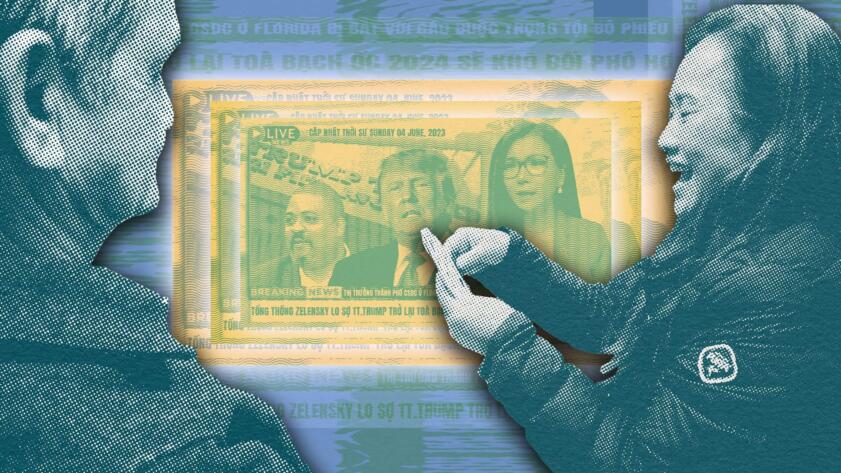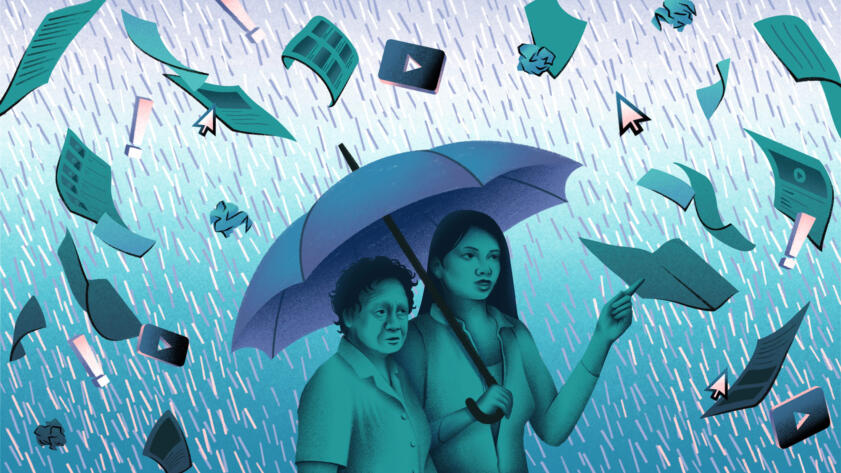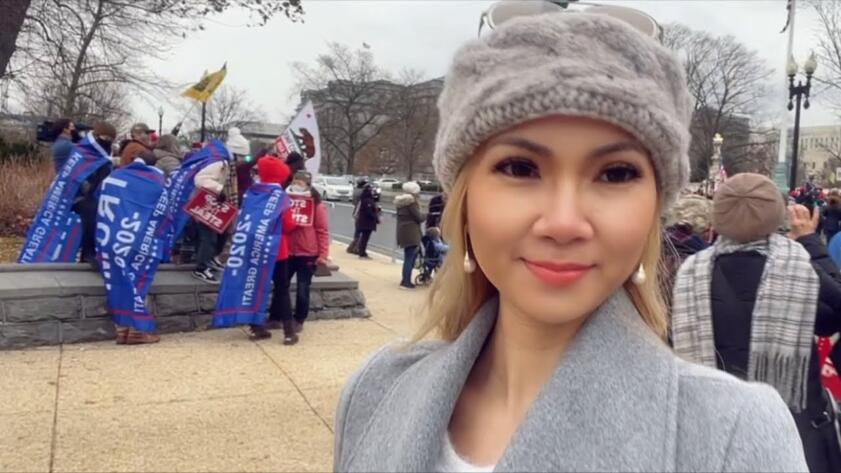The Markup, now a part of CalMatters, uses investigative reporting, data analysis, and software engineering to challenge technology to serve the public good. Sign up for Klaxon, a newsletter that delivers our stories and tools directly to your inbox.
Sonia Ohlala is not your typical YouTube influencer.
Her videos—all in Vietnamese and targeted to the Vietnamese immigrants in America—often come with titles that contain unfounded claims or misleading statements:
- “BIDEN ADMINISTRATION ISSUES SOCIAL SECURITY NUMBERS TO ILLEGAL IMMIGRANTS IN THE US” (July 2022)
- “BIDEN INTENTIONALLY INFLATES NUCLEAR WAR TO PROMOTE RADIOACTIVE MEDICINE” (October 2022)
- “THE BIDEN ADMINISTRATION RELEASED MORE THAN 1,300 ILLEGAL CRIMINAL IMMIGRANTS INTO THE COMMUNITY” (January 2023)
On January 6, 2021, Ohlala live streamed while attending one of the protests that later led to the attack on the U.S. Capitol. The next day, she called for her viewers to “Fight for President Trump in Washington DC! Historic moment!” A year later, Ohlala posted about proudly fighting “for my country and my rights” alongside “hundreds of thousands of patriots from all over the United States” who “gathered together in Washington DC to demand transparency for a disgraceful stolen election.”

Languages of Misinformation
Vietnamese YouTuber Is Filling Information Voids with Newsmax and Breitbart
How one Vietnamese community depends on YouTube for news, and what that tells us about the unmet needs of immigrant enclaves
These videos from Ohlala have since been deleted from YouTube, but The Markup was able to access the original video descriptions through the Internet Archive’s Wayback Machine.
After The Markup first reported on how Ohlala regularly translated misleading far-right websites like The Gateway Pundit and Newsmax into Vietnamese, more than a dozen Vietnamese community members asked The Markup to dig further. They wanted to know why she was broadcasting in Vietnamese and why her videos were so heavily pro-Trump. Several community members also shared suspicions that she was a Russian agent—to them, her content seemed to bear the hallmarks of the ways in which Russian political actors used misinformation to sow division among Americans during the 2016 election cycle. They also worried she may be partially created through deepfake technology like generative AI or text-to-speech tools because her images use heavy filters and because she publishes so frequently.
The vast majority of Ohlala’s YouTube videos show her in front of a green screen, but she occasionally posts photos of herself, many featuring guns, on her YouTube community page. Recently, she posted a photo of herself with a Los Angeles-based “I voted” sticker. In older posts, she wrote about how hot it was in California and how high gas prices were in Southern California.
But there isn’t much information on Ohlala beyond that. Searches for her name on multiple public records databases and other social platforms did not return any results outside of her online persona as a vlogger, suggesting that Sonia Ohlala is not her real name.
Multiple attempts to reach Ohlala also led nowhere. On her Facebook page, Ohlala listed an address in Florida (rather than California), a Facebook email, and a phone number. The Markup tried to contact her using all three. Her number, which has a British Columbia area code, was disconnected. Her Florida address pulled up ten names, and after calling every phone number listed for those addresses, The Markup found they were all disconnected. The Markup also emailed and messaged Ohlala on Facebook, but all messages have gone unanswered. Finally, The Markup posted comments on her YouTube videos, asking her to contact us, but have received no response.
Since The Markup has not been able to make contact with Ohlala, we dug further into her videos.
The Rise of Political Influencers
The Markup accessed and analyzed the videos available on Ohlala’s two YouTube Channels as of end of January 2024, including 645 videos on her main channel @SoniaOhlala, and 97 on her self-described “backup Youtube channel” @soniaohlalausa.
We found that Ohlala produces pro-Trump videos at a stunning rate—averaging roughly 9 videos per week in 2023—specifically for the Vietnamese community. Headlines praising former president Donald Trump are common on Ohlala’s page and Vietnamese people who have watched her videos noted that Ohlala often refers to Trump as if he was a king or a person of extremely high stature. She has just over 200,000 subscribers on her main YouTube channel and roughly 50,000 subscribers in her backup channel. In 2023, on average, her channels racked up more than 40,000 views per video. Ohlala’s following is smaller than long-established Vietnamese community news organizations like Người Việt Daily News in the U.S. (713,000 YouTube subscribers), but she’s still a considerable player in the media landscape for Vietnamese Americans. Many community members we spoke to, both pro-Trump and otherwise, knew of her videos or watched them.
The presence and popularity of news influencers like Ohlala in immigrant communities is not uncommon.
“Influencers have started to play a really large role in where people get information,” said Josephine Lukito, an assistant professor at University of Texas in Austin, Texas, who primarily studies misinformation and disinformation in the U.S. and abroad. “That’s true regardless of the political ideology, as well as the geographic region. Challenges are exacerbated for minority communities, particularly in the area of mis- and disinformation detection in non-English [languages].”

Languages of Misinformation
Second-Generation Americans: What to Do When Loved Ones Are Sharing Misinformation
Don’t get into a political argument. Talk about misinformation instead
The introduction of deepfakes and consumer-friendly, free generative AI tools, has only made the news landscape more confusing, especially for immigrant communities who rely on social media platforms like Facebook and YouTube for news in their native language.
For years, researchers raised alarms around political misinformation in immigrant communities. After the Senate’s border security and foreign aid bill gained more national attention in early 2024, Spanish-language misinformation increased sharply and spread narratives like the “great replacement” theory, which says that Democrats use immigration to replace White U.S. citizens. During the 2020 election cycle, messages on WeChat discouraged Chinese American voters from going to the polls, and anti-Democrat memes with mis- and disinformation spread on WhatsApp among South Asian communities in the U.S.
But unlike figures like Infowars founder Alex Jones, who faced litigation and fines for his spread of misinformation to their audiences, influencers in immigrant communities like Sonia Ohlala or King Radio often go about their business unscrutinized by authorities.
For immigrant communities, there’s little recourse to address misinformation that targets them. They are aware that Ohlala’s videos are questionable content, but in a community that often finds new content through YouTube’s recommendation algorithms, Ohlala is still gaining popularity.
There have been months where YouTube had zero new videos from Ohlala. But according to Sarah Nguyễn, a PhD candidate at University of Washington Information School, who researches information infrastructures and misinformation among immigrant and non-English diasporic communities—and who has been tracking and archiving Ohlala’s content since 2020—Ohlala appears to have deleted videos that were previously on her YouTube channel. Snapshots of her personal blog, archived by the Wayback Machine, showed videos that are no longer accessible, including the aforementioned live stream of her attending the January 6th pro-Trump protests that eventually led to the Capitol riots.
Sources of Misinformation
To better understand where Ohlala gets her information, The Markup analyzed 431 posts on her main YouTube account’s community page. In these posts, Ohlala briefly describes her videos, and sometimes provides links to her sources. We found 3,616 links, and analyzed them to see what organizations Ohlala cites the most.
Below are the top 15 websites, besides her own, that Ohlala linked to as sources, along with an assessment of their partisan leanings from an analysis performed by Ad Fontes Media:
Ohlala’s Youtube community page most often quotes the Gateway Pundit, a website that has a track record of publishing false and misleading information, though she also cites more trustworthy sources, like Reuters and the Associated Press, into her videos.
This mix “creates more information disorder,” said Nguyễn.
“Sometimes it’s bad information, sometimes it’s good information. But that creates even more distrust within our information environment. So then, your information diet itself is already on shaky grounds,” she said.
For the one dozen Vietnamese U.S. residents who spoke to The Markup and know of Ohlala’s videos (though they don’t watch her), the lack of transparency around her real identity was a major issue and led them to mistrust her videos.
The rate at which Ohlala creates content, the political nature of it, and the quality of the production, which includes many flashy graphics, points to the possibility that more than Ohlala herself works on the videos.
“But she never recognizes that there’s someone more than just her producing this content,” said Nguyễn. “There’s something more happening within this type of channel, who has a large following, large subscriber and viewership, and the content that she’s creating that needs to be picked apart more.”
But in lieu of big tech companies like YouTube demanding transparency from people who broadcast news on their platform, it is often the responsibility of individuals, like the Vietnamese community members who spoke to The Markup, to bring up questionable content creators.
A lot of the work to stem misinformation within non-English speaking communities falls on the shoulders of the very same community members who are most impacted by the misinformation, said Nguyễn. “That shouldn’t be the case.”




